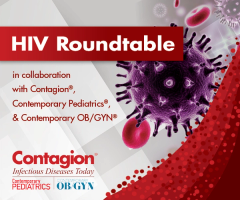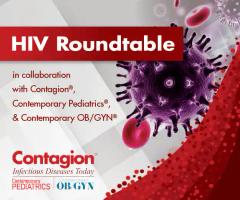
HIV Roundtable: Adolescents and Issues Around Care, Adherence, and Privacy
In this last episode, our panel discusses this patient population and the challenges around keeping them in the continuum of care.
This is the third and final episode of our series on HIV care and management. This is a continuing collaboration working with our partners Contemporary Pediatrics and Contemporary OB/GYN.
This series discusses several aspects of HIV care including clinical management, therapies, vaccines, multidrug resistance, PrEP, and patient management in adolescents.
Our panel of clinicians includes:
- MJ Kasten, MD, associate professor of Medicine, consultant, Division of Public Health, Infectious Diseases, and Occupational Medicine, Department of Internal Medicine, Mayo Clinic
- Natasha Hoyte, MPH, CPNP-PC, New York-Presbyterian School Based Health Centers
- Aimalohi Ahonkhai, MD, MPH, associate physician, medicine at the Massachusetts General Hospital, associate director of the Bio-behavioral and Community Science Core and director of the Community Engaged Research Program for the Harvard University Center for AIDS Research
- Jessica Castilho, MD, associate professor of Medicine, Division of Infectious Diseases, associate professor Dept. of Health Policy, Vanderbilt University Medical Center
In this episode, the panel provides clinical feedback on the challenges for teens and young adults regarding staying in the continuum of care, adherence for PrEP, and potential adverse effects associated with it.
For adolescents who either are newly diagnosed with HIV or are trying to prevent contracting the virus, there are challenges around privacy.
“HIV care for a young person may be associated with forced disclosure around sex itself and sexuality, which may be really difficult depending on the family dynamic,” Ahokhai said. “I've been in some really, really challenging appointments with families around this very issue. I mean, heartbreakingly, so.”
For those who begin taking oral PrEP, patients can have PrEP startup syndrome, which may include nausea, decreased appetite, and headaches explained Hoyte, but these symptoms typically resolve within a matter of weeks.
As with all patients taking medicine, it is incumbent for providers to monitor them for any potential side effects.
“Generally speaking, the good news is that these medications are very well tolerated. There are side effects, and we are still monitoring the patients while they're on them, which is the point. In the case of PrEP, we are monitoring patients once every 3 months or every other month,” Hoyte said.
Newsletter
Access practical, evidence-based guidance to support better care for our youngest patients. Join our email list for the latest clinical updates.







